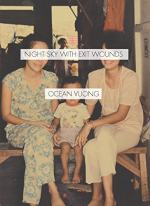|
This section contains 894 words (approx. 3 pages at 400 words per page) |

|
Night Sky With Exit Wounds Summary & Study Guide Description
Night Sky With Exit Wounds Summary & Study Guide includes comprehensive information and analysis to help you understand the book. This study guide contains the following sections:
This detailed literature summary also contains Quotes and a Free Quiz on Night Sky With Exit Wounds by Ocean Vuong.
The following version of this book was used to create this study guide: Vuong, Ocean. Night Sky With Exit Wounds. Copper Canyon Press, 2016.
Night Sky With Exit Wounds is broken into three untitled sections, with the introductory poem "Threshold" preceding the start of the first section. The collection does not follow a strict linear narrative, and the poems take place at different times in various parts of the book, however, the three sections do follow a loose timeline, with the first section detailing events from early in the speaker's life, and the third section describing more recent occurrences. Time and ages are not referred to often, so it is hard to tell exactly when each poem takes place. "Threshold" introduces the main speaker of the collection, as well as the character of his father, who is the most important character in the book, other than the speaker. It serves to introduce the theme of fraught father-son relationships, as well as the theme of the body and human connection. In this first poem, the reader sees that the speaker's relationship with his father and his own body is troubled, but that the speaker yearns for them to be connected.
The first section of the book contains 11 poems, and jumps back and forth temporally, although for the most part it details events from earlier parts of the speaker's life. Poems like "Aubade with Burning City" "A Little Closer to the Edge," and "Immigrant Haibun," all take place prior to the speaker's birth. "Aubade with Burning City" details the evacuation of Saigon in 1975, and "A Little Closer to the Edge" and "Immigrant Haibun" describe the speaker's parents before his birth. These poems connect to the themes of family and the legacy of the Vietnam War, and the latter two feature the recurring characters of the speaker's mother and father. Other poems in this section focus on the speaker's father, and their relationship, such as "My Father Writes From Prison," "Always & Forever," "Telemachus," and "In Newport Beach I Watch My Father Lay His Cheek to a Beached Dolphin's Wet Back." Here, Vuong focuses on the nature of father-son relationships when the father carries the weight of past traumas. The father is depicted as a fearsome, violent man who also contains the capacity for compassion. The speaker's mother also features prominently in this section, and she appears most notably in "The Gift" and "Headfirst," where she is a figure of love and wisdom. The father's aggression is contrasted with the quiet benevolence of the mother, who still finds time to teach her son to read, despite working long hours at a nail salon and barely knowing English herself. While most of the poems in this section deal with the speaker and his family, "Aubade with Burning City," "Immigrant Haibun," and "Self-Portrait as Exit Wounds" are notable for their examination of the legacy of the Vietnam War. Thus, the first section engages primarily with the speaker's family and their flight from Vietnam, and examines the speaker's identity as the son of immigrants fleeing Vietnam.
The second section also contains 11 poems, and takes place during the speaker's adolescence, for the most part. The speaker now deals with loneliness, relationships, and his sexuality as a man who is attracted to men. Sexuality is the strongest theme in this section, and the speaker first begins to discover his sexuality in poems like "Homewrecker" and "Because It's Summer." He deals with loss and heartbreak in "Anaphora as Coping Mechanism," in which he wrestles with the death of a lover. "Seventh Circle of Earth" examines what it means to be gay in America, and the speaker of the piece is a gay man who was murdered in Dallas in 2011 when he was burned to death inside his home with his partner. The second section focuses on the speaker's exploration of his sexuality and the gay identity.
The third section is 12 poems long, and features more recent poems which take place during the speaker's adulthood. This section is concerned with the culmination of the themes of the first two sections, as well as with what it means to be a poet. The speaker continues to examine his identity, especially how it relates to his family, his sexuality, and his home country of Vietnam. "Torso of Air" and "Someday I'll Love Ocean Vuong" focus on the body, and way it can define one's reality. "Devotion" and "Ode to Masturbation" celebrate sexuality; "Devotion" is centered on the speaker's relationship with another man, while "Ode to Masturbation" deals with masturbation, and sexuality in general. Here, the speaker is no longer figuring out love and sex, but has come to adore the joys and pitfalls it brings. His relationship with his father is examined further as well, in "Deto(nation)," "Daily Bread," "To My Father/ To My Future Son," and "Odysseus Redux." The speaker is facing the pain his relationship with his father brings him, and acknowledging his desire to one day be reunited with him, despite the troubled nature of their relationship. The speaker's relationship to Vietnam is examined in "Daily Bread," in which he realizes that he must come to know his home country through writing about it. "Notebook Fragments" offers a culmination of many of the themes of the book, with the speaker contemplating his family, the nature of war, and his sexuality.
Read more from the Study Guide
|
This section contains 894 words (approx. 3 pages at 400 words per page) |

|



